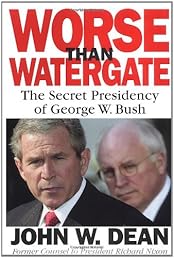
|
Literature & Fiction Rating: 4.0 / 5.0 (208 votes) Released: 2004-04-06
(as of 2012-10-07 02:11:19 PST) |
DescriptionNobody knows more, both from first hand experience and legal expertise, about the abuse of presidential power and their dangers than John Dean, former counsel to President Nixon. In Worse Than Watergate, Dean delivers a stunning indictment of the current Bush administration, and issues an urgent alarm to the nation: the Bush team's obsession with secrecy and their willingness to deceive make them even more dangerous than Nixon's. Dean brilliantly explores Bush's emphasis on image over substance; his angry, mistrustful personality; his excessive fear of leaks; his reversing the work of his predecessors in opening up government; his imperial governing combined with deeply flawed decision making; and his serious abuses of national security secrecy. From refusing to explain the precarious health of the powerful vice president to hiding the identity of those setting the nation's energy policy, from obstructing 9/11 investigations to unprecedented secrecy in the name of fighting terrorism, Dean exposes the dangers of a presidency that is using weapons of mass deception against the American public.
Editorial ReviewThe most facile presidential comparison one could make for George W. Bush would be his father, who presided over a war in Iraq and a struggling economy. Some "neocons" reject the parallel and compare Bush to his father's predecessor, Ronald Reagan, citing a plainspoken quality and a belief in deep tax cuts. But John Dean goes further back, seeing in Bush all the secrecy and scandal of Dean's former boss, the notorious Richard Nixon. The difference, as the title of Dean's book indicates, is that Bush is a heck of a lot worse. While the book provides insightful snippets of the way Nixon used to do business, it offers them to shed light on the practices of Bush. In Dean's estimation, the secrecy with which Bush and Dick Cheney govern is not merely a preferred system of management but an obsessive strategy meant to conceal a deeply troubling agenda of corporate favoritism and a dramatic growth in unchecked power for the executive branch that put at risk the lives of American citizens, civil liberties, and the Constitution. Dean sets out to make his point by drawing attention to several areas about which Bush and Cheney have been tight-lipped: the revealing by a "senior White House official" of the identity of an undercover CIA operative whose husband questioned the administration, the health of Cheney, the identity of Cheney's energy task force, the information requested by the bi-partisan 9/11 commission, Bush's business dealings early in his career, the creation of a "shadow government", wartime prisoners held at Guantanamo Bay, and scores more. He theorizes that the truth about these and many other situations, including the decision to go to war in Iraq, will eventually surface and that Bush and Cheney's secrecy is a thus far effective means of keep a lid on a rapidly multiplying set of lies and scandals that far outstrip the misdeeds that led directly to Dean's former employer resigning in disgrace. Dean's charges are impassioned and more severe than many of Bush's most persistent critics. But those charges are realized only after careful reasoning and steady logic by a man who knows his way around scandal and corruption. --John Moe
|
|||||||||||||||||||
Become a fan of Book Presence on Facebook for the inside scoop on latest and most exclusive books.





